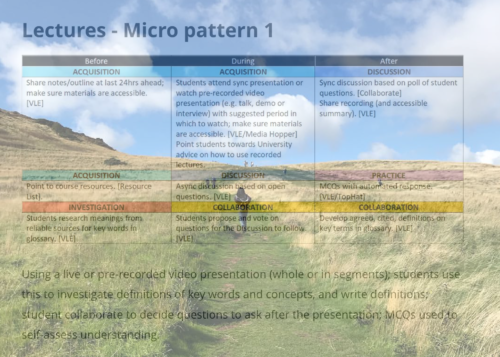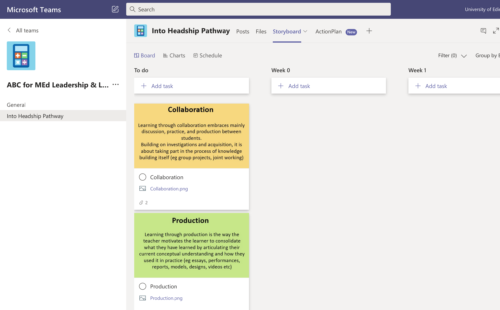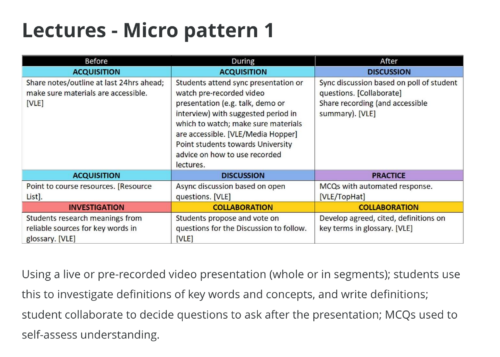
Hope everyone is keeping well. I haven’t posted in a long time as I have been a wee bit busy. It has been fairly full on since mid-March for me so it is good to come up for a breath every so often before taking the next plunge.
I suspect like most of us in HE, we at the University of Edinburgh are spending the summer preparing for the uncertainty of the next academic year and doing what we can to make that all a little less uncertain. Granted, there are larger uncertainties surrounding all of this (employment being one), but we are keen to move forward at least with teaching and learning. So sharing a few bits in this post that hopefully might prove useful to some (and help me organise my own thinking). I will organise this around design and dialogue as that is really the focus of most of my activity.
Design
This is where I am truly fortunate to have some of the best colleagues in the world both centrally, across the university, and in my own school Moray House School of Education and Sport (MHSES). I would name them all here but that would take half the post. Either way, I have never been around so many people of such capacity and cheer. They meet every challenge as an opportunity and I am emboldened by them.
We are approaching this in roughly two ways: through ABC course design sessions and micropatterns.
Course Design
We use ABC (as I am sure many many HE institutions do). ABC (Arena, Blended, Connected) curriculum design, adapted from the work of Professor Diana Laurillard and created by UCL Digital Education, is a hands-on 90-minute workshop where academic teams work together to create a visual ‘storyboard’ outlining the type and sequence of learning activities (both online and offline) required to meet the course’s learning outcomes.
ABC is a card-based method for course design based on the concept of learning types derived from the Conversational Framework model. A learning type is defined on one side of a card, and on the other side conventional and digital learning activities (the practice) are detailed. As the workshop progresses these are sequenced into a large storyboard sheet representing the student journey. We have used this throughout the University of Edinburgh for years. Very accessible and very participatory. Most of this work at the University of Edinburgh has been done very well by Jon Jack, Tracey Madden, and others.
To move it online, we use MS Teams. In MHSES, we are creating a Teams group for each programme and then populating the courses as individual channels within that Teams group. The point here being that the entire programme can see the storyboards for each course allowing for capacity building and some programme level fine tuning (if needed). We use Planner for the storyboards. The cards are dropped into weekly columns over a course of 90 minutes. We have done many of these in MHSES and are scheduling many many more.

Micropatterns
Jon Jack and fellow learning technologists throughout the university have come up with a series of micropatterns, which are worked through seqeuences of common teaching types (lecture, seminar, etc.). At MHSES, we provide these before the ABC course design workshop as a means of demonstrating what worked through examples look like. For some, this is enough as they can use the micropatterns as they are, or they can tweak them (which we encourage). Essentially the micropatterns work out to a week of activity online (roughly).
A further advantage to the micropatterns is that they map to Learn, the university’s official LMS. Which makes sense as my programme uses Moodle. So Jon and team created weekly folders in Learn that mapped to these templates. If the micropattern worked for them, the tutors could copy them over into their own Learn instance. The weekly folders are just shells that need to be filled in but the sequences are taken care of.

This approach, due to the time constraints we are under, requires a bit of homework on the part of the course organisers. They need to familiarise themselves with the cards and the micropatterns before the session (which is not how you would normally run an ABC). So Herve Lacroix, an exceptionally resourceful learning technologist at MHSES, created a resource for everyone to review ahead of the session. The resource has proven really useful in framing the discussion with course organisers.
Dialogue
We are talking to everyone willing to talk to us, sharing across the university and across universities, and truly relying on our network to see us through to something less a reaction and more a renewal of sorts (at least that is how I see this process). A lot of this is coming through the podcast.
We recorded a few recently on hybrid (Episodes 15 and 16) that might be useful for some, and the two most recent ones below are worth a listen.
Episode 17: I mentioned Jon Jack several times on this post and we were lucky enough to have him on the podcast talking about the very design that I describe above.
Episode 18: We are learning from our networks constantly here and so we were lucky enough to have Dr Maryam Ismail and Said Yunus from the State University of Zanzibar (SUZA) on the podcast talking their response to Covid and how that response was largely built on past projects to build capacity at the university for digital. Lovely people and a lovely chat.
That is enough for now, I reckon. Sending all my best to you all, wherever you might be. Stay well, stay safe.


